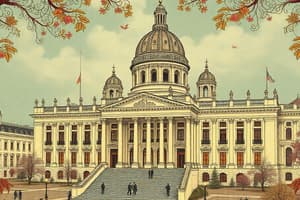Podcast
Questions and Answers
Democracy is a type of political system primarily characterized by totalitarianism.
Democracy is a type of political system primarily characterized by totalitarianism.
False (B)
The primary function of law includes the maintenance of public order and safety.
The primary function of law includes the maintenance of public order and safety.
True (A)
Liberalism is a major political theory that emphasizes the importance of social equality.
Liberalism is a major political theory that emphasizes the importance of social equality.
False (B)
Civil law primarily governs crimes and their punishments.
Civil law primarily governs crimes and their punishments.
Due process is a legal principle that ensures fair treatment in judicial proceedings.
Due process is a legal principle that ensures fair treatment in judicial proceedings.
The judiciary branch is responsible for making laws.
The judiciary branch is responsible for making laws.
Social movements have no significant impact on political agendas.
Social movements have no significant impact on political agendas.
Totalitarianism allows for a high degree of individual freedoms and political plurality.
Totalitarianism allows for a high degree of individual freedoms and political plurality.
Flashcards are hidden until you start studying
Study Notes
Humanities and Social Sciences: Politics and Laws
Politics
-
Definition: Study of power, governance, and the behavior of political institutions and individuals.
-
Key Concepts:
- Political Systems: Types include democracy, authoritarianism, monarchy, and totalitarianism.
- Political Theories: Major theories include liberalism, conservatism, socialism, and feminism.
- Public Policy: The process of creating laws and regulations to address societal issues.
- Political Behavior: Examines voting patterns, public opinion, and political participation.
-
Political Institutions:
- Legislature: Body responsible for making laws (e.g., Congress, Parliament).
- Executive: Enforces laws (e.g., President, Prime Minister).
- Judiciary: Interprets laws and administers justice (e.g., courts).
Laws
-
Definition: System of rules created and enforced through social or governmental institutions.
-
Key Functions of Law:
- Regulation: Establishes standards for behavior.
- Protection: Safeguards rights and liberties of individuals.
- Dispute Resolution: Provides mechanisms for resolving conflicts.
- Social Order: Maintains public order and safety.
-
Types of Law:
- Criminal Law: Governs crimes and punishment.
- Civil Law: Deals with disputes between individuals or organizations.
- Administrative Law: Regulates governmental agencies.
- Constitutional Law: Focuses on the interpretation of the constitution.
-
Legal Principles:
- Rule of Law: The law applies equally to all individuals.
- Due Process: Legal requirement for fair treatment in judicial proceedings.
- Separation of Powers: Division of government responsibilities into distinct branches.
Interconnections
- Influence of Politics on Law: Political ideologies and power dynamics shape legal systems and legislation.
- Role of Social Movements: Advocacy groups influence political agendas and reform laws for social justice.
- International Law: Governs relations between states, involving treaties and human rights.
Conclusion
Understanding politics and laws within the humanities and social sciences provides insight into how societies organize, govern, and address conflicts. This knowledge is crucial for analyzing contemporary issues and participating in civic life.
Politics
- Definition: Investigates power dynamics, governance structures, and behavior of political entities.
- Political Systems: Varieties include:
- Democracy: Rule by the majority through free and fair elections.
- Authoritarianism: Centralized control with limited political freedoms.
- Monarchy: Governance by a royal family, often hereditary.
- Totalitarianism: Highly centralized and dictatorial control over many aspects of life.
- Political Theories: Major ideological frameworks encompass:
- Liberalism: Emphasizes individual rights and equality.
- Conservatism: Focuses on tradition and gradual change.
- Socialism: Advocates for social ownership and egalitarian distribution of resources.
- Feminism: Seeks to address gender inequalities and promote women's rights.
- Public Policy: Involves the formulation of laws and regulations aimed at solving social problems.
- Political Behavior: Studies how citizens engage in politics through voting trends and public sentiment.
- Political Institutions:
- Legislature: Creates laws (e.g., Congress and Parliament).
- Executive: Implements and enforces laws (e.g., President and Prime Minister).
- Judiciary: Interprets laws and provides justice (e.g., courts).
Laws
- Definition: A structured framework of rules, enforced by authorities to govern behavior in society.
- Key Functions of Law:
- Regulation: Sets standards for acceptable conduct.
- Protection: Defends individual rights and freedoms.
- Dispute Resolution: Offers processes for managing conflicts.
- Social Order: Upholds public safety and peace.
- Types of Law:
- Criminal Law: Addresses offenses against the state and punishment.
- Civil Law: Manages disputes between individuals or entities.
- Administrative Law: Oversees the operation of governmental agencies.
- Constitutional Law: Interprets constitutional principles and rights.
- Legal Principles:
- Rule of Law: Ensures laws are applied consistently to all individuals.
- Due Process: Guarantees fair legal proceedings and treatment.
- Separation of Powers: Divides government authority into distinct branches (executive, legislative, judicial).
Interconnections
- Influence of Politics on Law: Political beliefs and structures heavily influence the formation and evolution of legal systems and regulations.
- Role of Social Movements: Advocacy groups drive political change and push for amendments to laws promoting social equity and justice.
- International Law: Regulates interactions between nations, focusing on treaties, agreements, and global human rights protections.
Conclusion
Comprehension of both politics and laws is essential for deciphering societal organization, governance methods, and conflict resolution, thus enhancing civic engagement and analytical skills regarding modern societal challenges.
Studying That Suits You
Use AI to generate personalized quizzes and flashcards to suit your learning preferences.




